
SDS 101: Everything you need to know about safety data sheets
What is a Safety Data Sheet and what does it tell you?
Are you ready to take your chemical safety game to the next level? Look no further than safety data sheets (SDS's)!
These documents are the key to creating a safe workplace and are outlined by the Globally Harmonized System (GHS) as well as CLP. Safety data sheets contain 16 sections that provide information on all the hazardous properties of a specific chemical product. SDS's are like a treasure map to navigating hazardous chemicals.
From understanding the dangers posed by these substances to knowing how to handle and dispose of them, SDS's are the ultimate tool in keeping your employees safe. But don't forget, it's up to you to maintain and manage your SDS's to make sure everyone is informed and prepared.
So, let's make chemical safety a top priority!
What do you do when you receive an SDS?
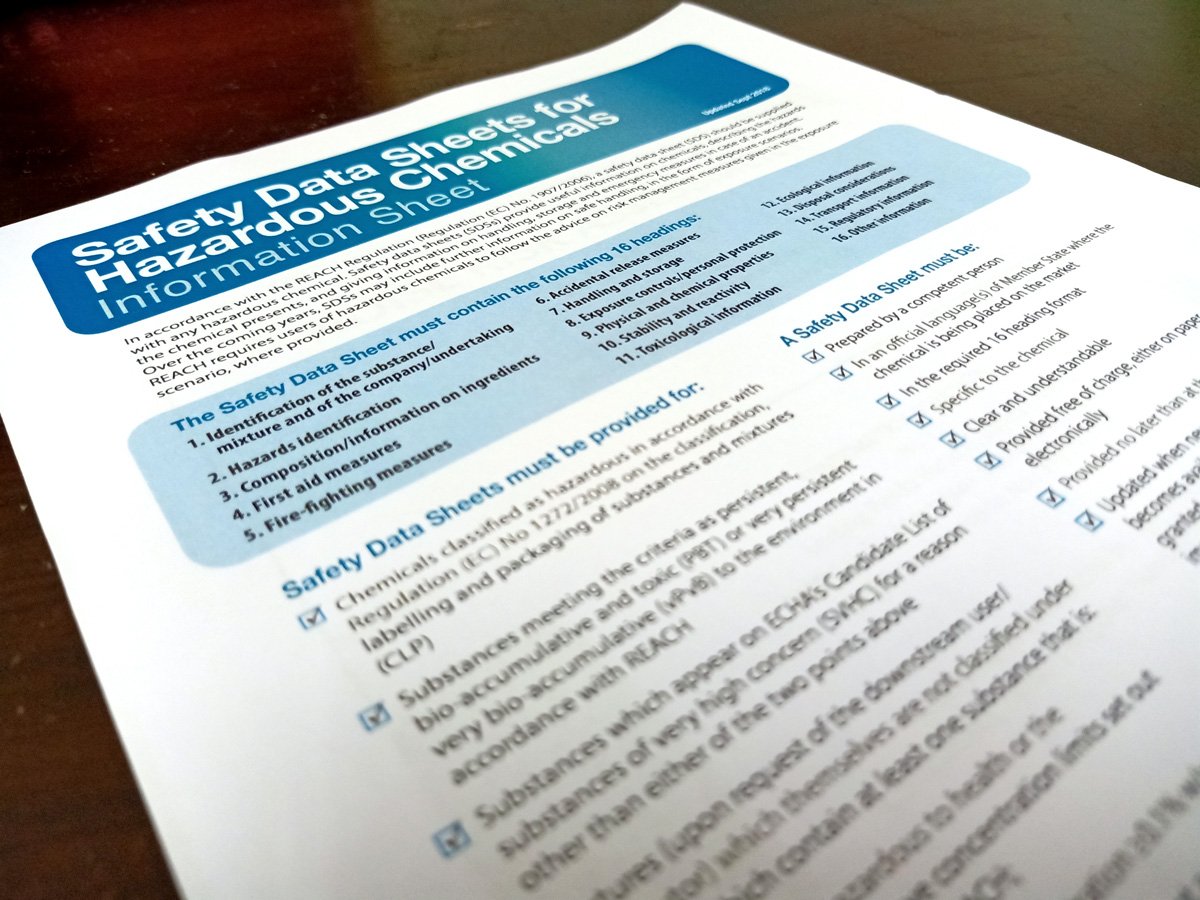
Now you know what an SDS is, but now what do you actually do with it?
Safety data sheets come with every hazardous chemical and can be long and confusing to read, especially if this is your first time. The first and most important step is checking your SDS is complete. Don’t worry you don’t have to memorise all the steps we’ve created this handy safety data sheet checklist to help you out.
You’ll also find the exact things you should review to make sure your SDSs are compliant with your local legislation and company procedures.
Your Chemical inventory and SDS
Good SDS management starts with a comprehensive chemical inventory. To help you structure yours, we have created a free chemical inventory template for you to download.
This template includes guidance on key information to supply to make sure your inventory is as up to date as possible.
SDS Section 2: Master the hazard symbols and their meanings
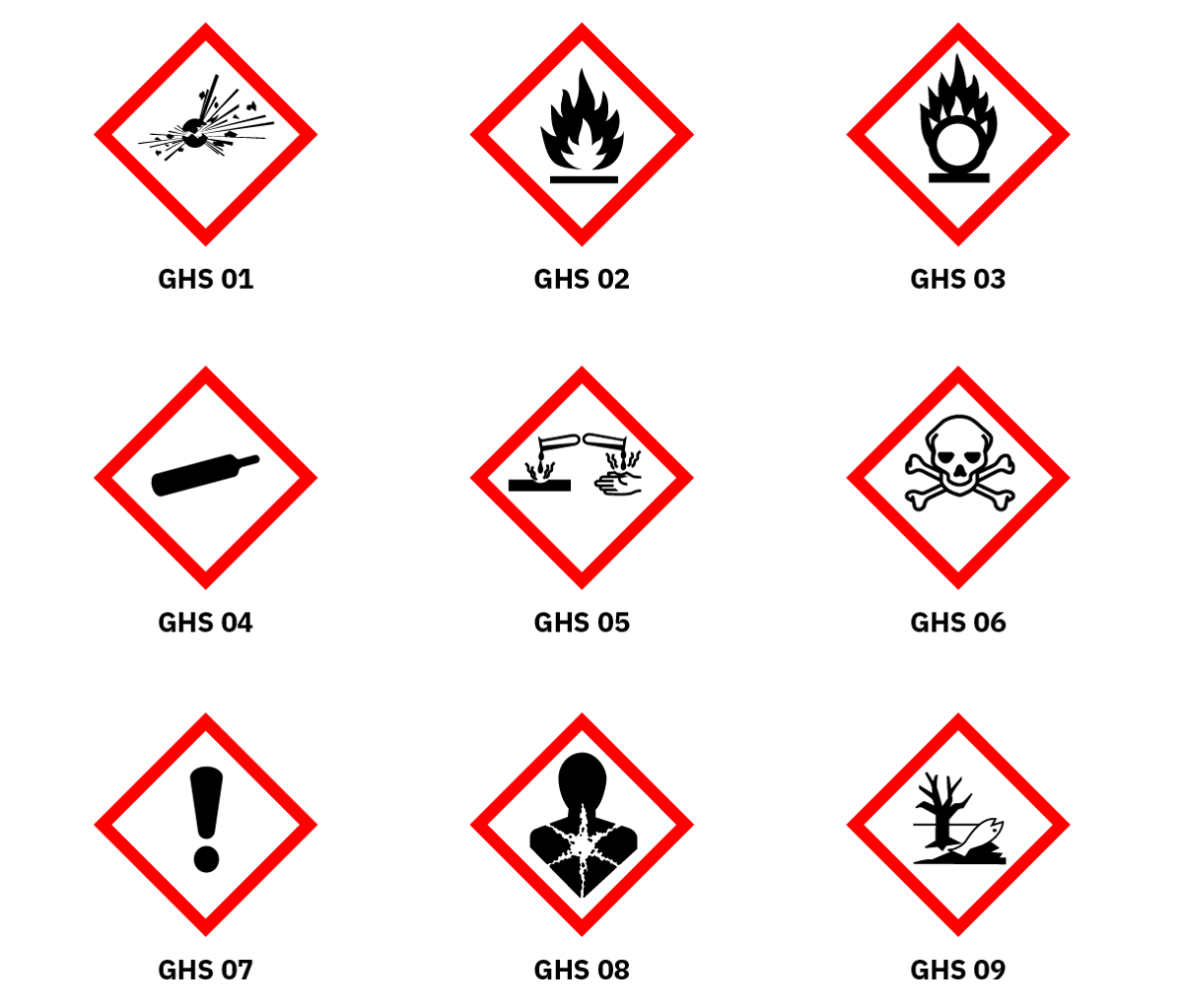
Let’s dive into SDS section 2. This section helps you uncover the not-so-hidden meaning of hazard pictograms while also providing you with all the information you need to have on your product labels.
The above hazard pictograms were introduced as part of the Globally Harmonized System (GHS), from which the majority of SDS legislation is derived.
Ensuring compliance with legislation when purchasing chemicals is all well and good, but it’s crucial that you don't’ overlook understanding and implementing crucial safety information within your SDS.
So when it comes to handling chemicals and keeping your team safe, taking a closer look at SDS section 2 is an absolute must. Let's bridge that gap for enhanced workplace safety.
From Hazard to Harmony: Uncovering the Significance of Hazard Pictograms
When thinking of chemical safety, Hazard pictograms are one of the first things that spring to mind (especially now that you understand the meanings of the different hazard symbols). Designed to be evocative and immediately recognisable, hazard pictograms give vital information on the potential risks of a substance.
Because of this, you need to know how to use them correctly. Keep reading to gain a better understanding of these symbols and what they mean.
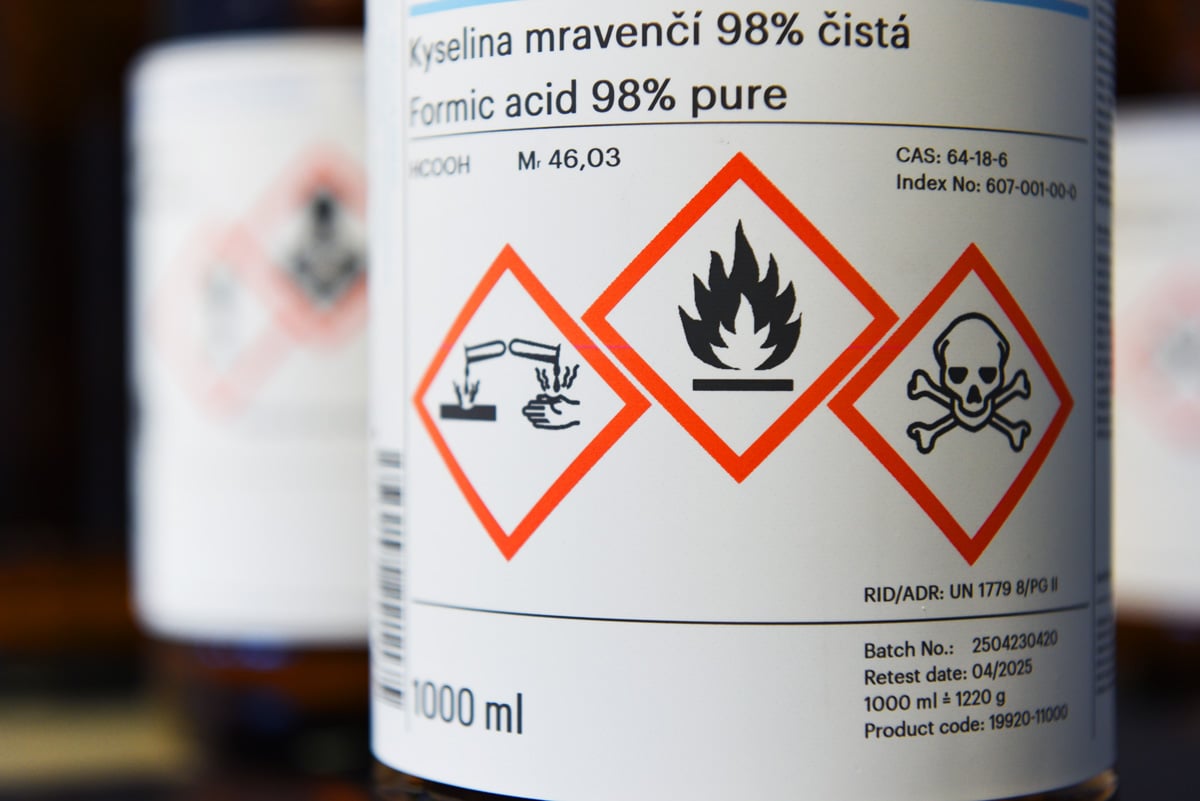
How to use SDS sections 4,7, & 8 to keep your employees safe
It's important you know how to read all the SDS sections because if there is an emergency, you’re prepared. Although we always hope for sunny days, here are three sections that are good to have bookmarked, just in case...
SDS section 4 outlines the exact first aid measure you need to take if one of your employees is exposed to a harmful chemical. (Even if you don’t have any medical background).
SDS section 7 covers how to safely store and handle chemicals. Understanding this section can help make sure you’ll never need to use section 4.
SDS section 8 provides information on exposure controls and occupation exposure limits (OSLs). Most importantly, it describes what PPE is required to help minimise exposures and keep your employees safe.
We dive deeper into each of these questions in 3 quick one-minute videos on how to read an SDS.
How well do you know your safety data sheets?
![]()
With 16 sections, learning to navigate your SDSs can seem like a daunting task. Take this interactive quiz to discover if you’re an SDS student, pro, or expert.
6 Key Duties for Every Chemical Manager
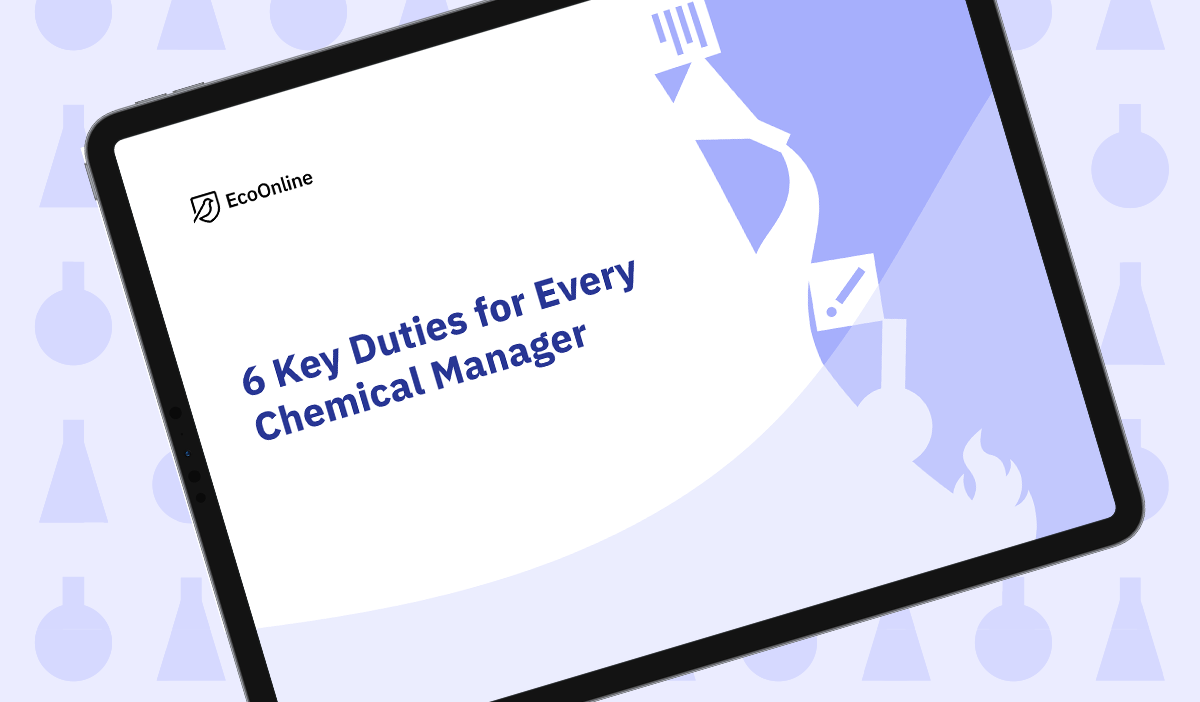
It’s important to do everything you can to reduce the risks associated with handling chemicals in the workplace. Not only in order to adhere to regulations such as EU REACH and UK REACH, but also to ensure your employees are kept safe.
Your first duty as a chemical manager is to make sure you have an up-to-date safety data sheet for every chemical product. And you need to make sure every employee has access to this important information.
In total there are 6 key duties you need to maintain your legal compliance:
- You must have a safety data sheet for all chemical products
- Your safety data sheets must be up to date
- You must carry out COSHH/ chemical risk assessments
- You must give your employees access to the information and provide instructions for safe use
- You must keep the data for 10 years after the end of use
- You must assess whether dangerous substances can be substituted
While zero incidents are always the goal, accidents (unfortunately) happen. Everything can’t be fully perfect 24/7. But, by understanding the specific requirements of each of these duties, you can help keep your employees protected.
Dive deep into the 6 Key Duties for Every Chemical Manager and the regulations that govern them.
Label your way to success: Strategies for effective CLP compliance
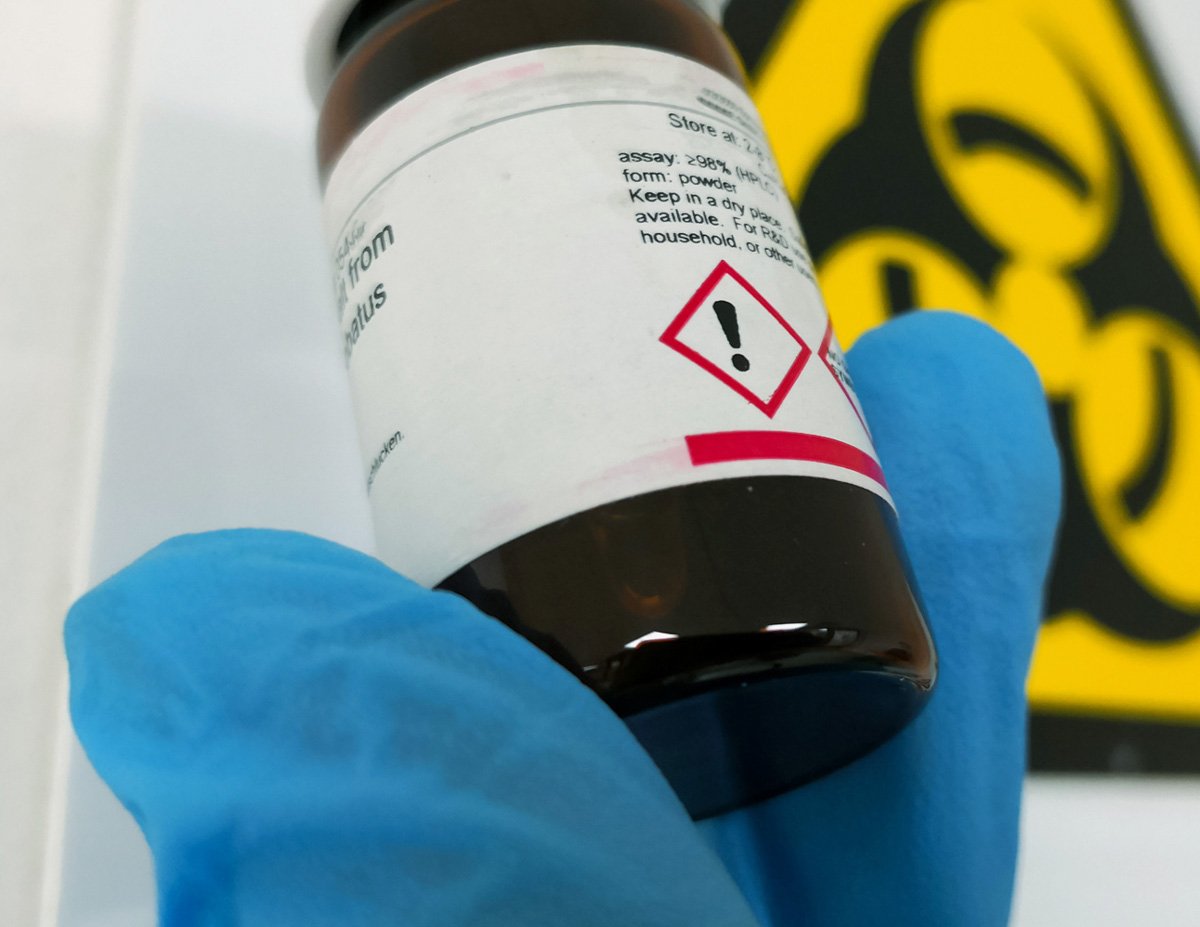
Now that you fully understand your duties as a chemical manager, let’s take a closer look into CLP labelling requirements. But first, what is a CLP label?
The Classification, Labelling and Packaging Regulation (or CLP) sets out the guidelines for chemical labelling in the EU. With new hazard classes, classification criteria and other revisions on the horizon, you need to be confident your chemical labels are compliant.
In order to understand the specifics of chemical labelling, you need to know:
- The distinct types of hazard classes
- Labelling elements
- And the importance of SDS in the CLP system
When creating CLP labels, you’re going to use all the knowledge you’ve gained so far on this journey. You must use specific hazard pictograms, signal words, hazard, and precautionary statements. If you need a quick reference your Safety Data Sheets (SDS) can provide more information on the chemical substance if needed.
Remember, CLP labels must be printed in the official language of the country where the product is placed on the market. There are extremely specific sizing requirements you need to follow because the CLP regulation is legally binding in the European Union.
Don’t worry, you'll label your way to success after reading our blog on CLP labelling.
Know your CLP chemical label
Do you know your UFI code from your Signal word or product identifier? Deciphering your CLP chemical label doesn’t have to be a chore.
We have created this handy CLP poster to help you quickly understand your hazardous chemical labelling and make sure they are compliant with the latest regulations.
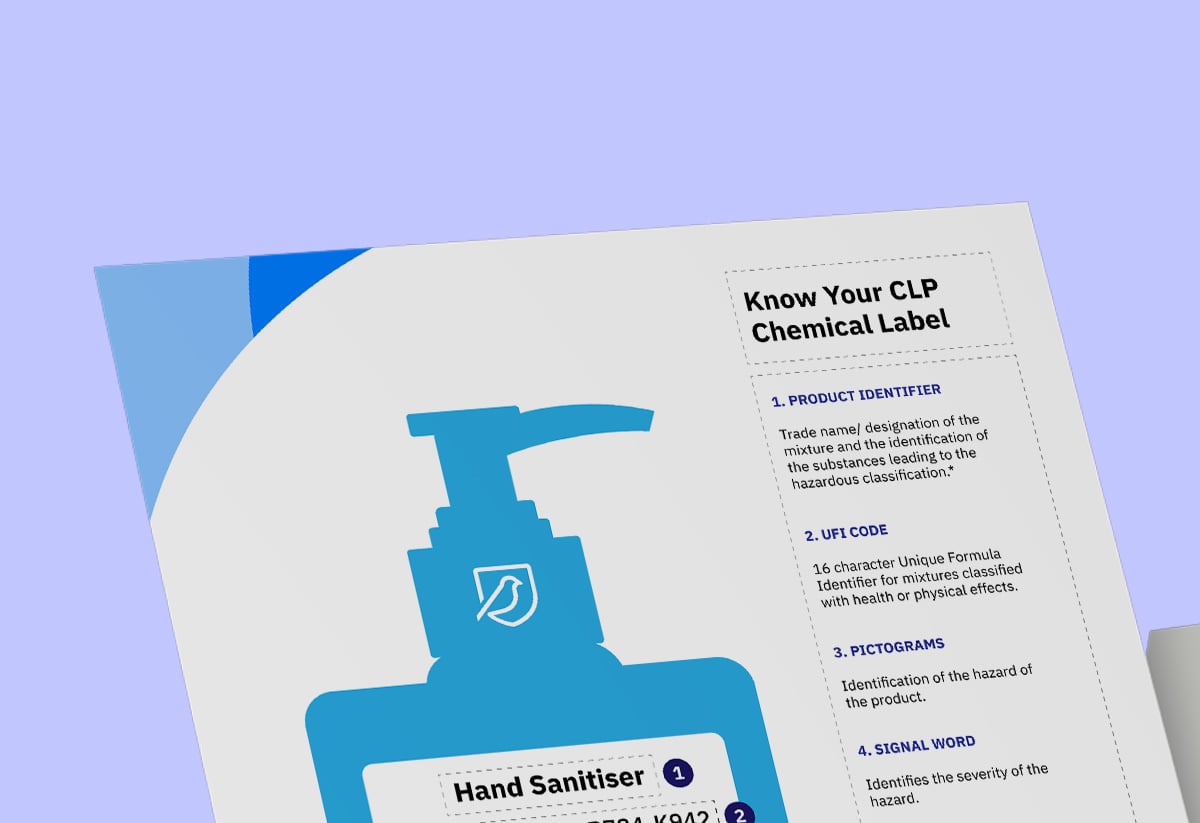
Feel like you could use some more SDS Training?

Training is an often overlooked element of SDS management. Chemical safety and proper chemical management is a huge topic with a lot of in-depth information to learn. Dedicated SDS training can have a dramatic impact on the safety of your employees, as well improving the overall quality of your SDS.
Let’s talk about the best way to implement SDS training in your organisation (and good news! It doesn’t require you to create more spreadsheets).
Explore how SDS training can benefit your employees and help promote a positive safety culture.
The ultimate guide to safety data sheet management
We’ve compiled everything you need to know about SDS management located in one (ultimate) guide! Inside you’ll discover an in-depth overview of safety data sheet management and the important information you need to know to ensure you're maintaining chemical compliance.
Download the guide to gain insights on:
- Relevant SDS legislation
- A complete breakdown of ALL 16 sections of your SDS
- Expert tips and best practices for SDS management success
- And so much more!
How to build a successful safety data sheet management programme

If you are managing hundreds of potentially hazardous chemicals, you not only have to stay on top of your inventory but also the hundreds of safety data sheets that go with them.
In this blog post, we bring you 8 key steps to build an SDS management programme that works for you. You'll learn your responsibilities as an employer and best practice guidelines on how to design your system and source your SDS.
Plus, we’ve included one of our most popular webinars where Dermot Dinan, Sales Manager at EcoOnline takes a closer look at the question...
“With new chemicals being added to your inventory, SDS expiring, and no one source of truth, how can you keep on top of managing them all?”
Not continually maintaining your inventory statistics is one of the most common mistakes chemical managers make (especially when you’ve just added new products into the mix).
Building a strong SDS management programme is the best way to help prevent you from making mistakes.
How Ekornes protected their employees with the click of a button...

Ekrones is a furniture manufacturer with over 2000 employees creating furniture from start to finish. They were using a paper-based system- storing their safety data sheets in folders across the organisation.
This reactive approach made it hard to comply with regulations and maintain compliance. By switching to a digital solution they were able to gain insights into the chemicals they have on site. They can now efficiently manage over 940 chemicals spread across 7 different locations.
Ensure all your employees have the information they need to stay safe- no matter where they are working
Keep your SDS and chemical inventory up-to-date with a digital solution that automatically updates, making it easy to track changes. Plus, all your information will finally be stored in one centralised location. That means no more wasted hours endlessly searching for outdated binders.
Explore our SDS Management Software
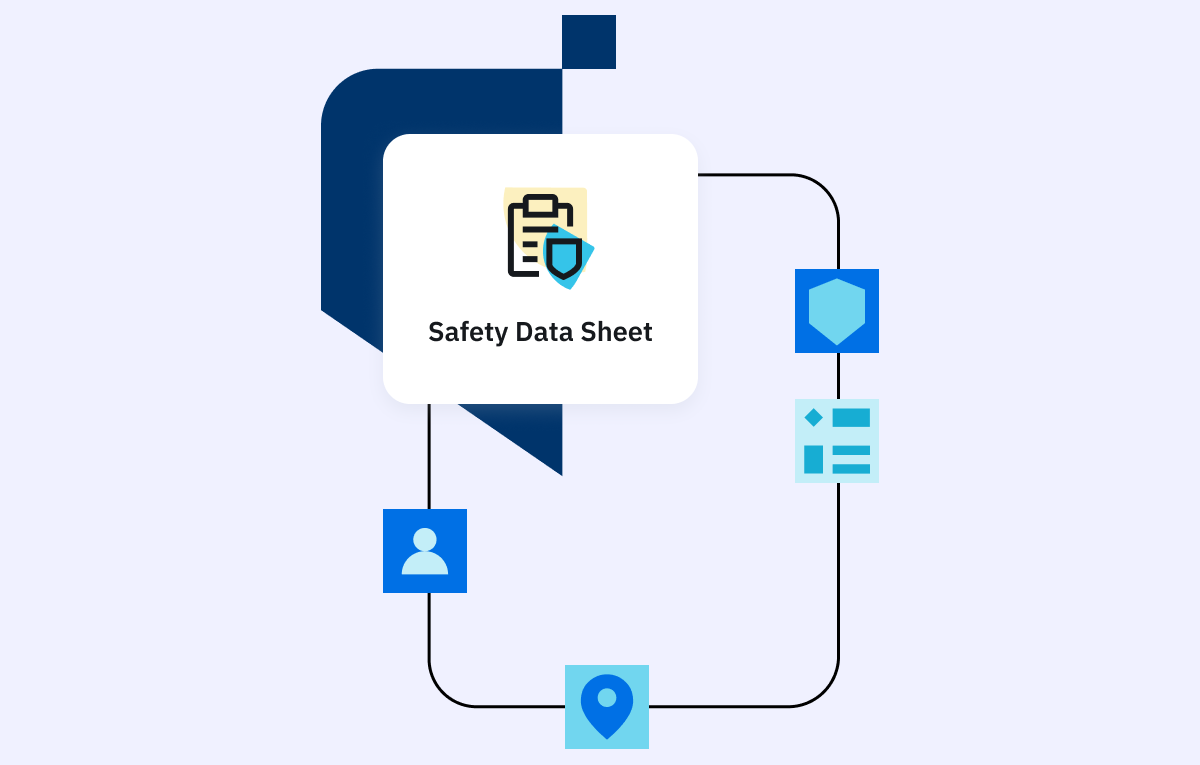
Let’s talk SDS authoring
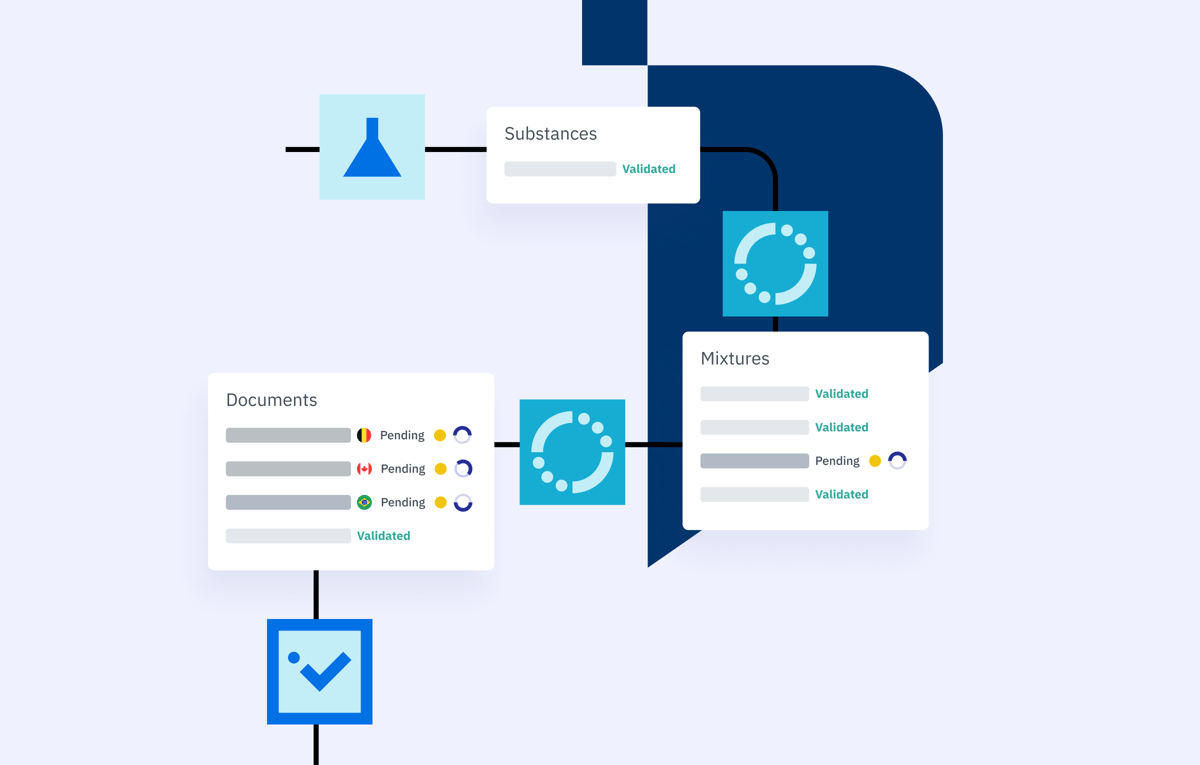
If you’ve made it this far, congratulations! You’re officially an SDS expert and should know everything you need to in order to build an efficient chemical safety process. It takes an expert to offer SDS authoring services.
In these next few sections, we are going to take a closer look into the SDS authoring process and how SDS authoring software can seamlessly stay up to date in an ever-changing landscape of regulations and compliance.
How to write an SDS
Whether you are a chemicals manufacturer or distributor, you are responsible for creating its safety data sheet.
SDS authoring is a complex process that requires high attention to detail. In fact, it’s so complex some people wonder if you need to have a special certification to write an SDS. Sometimes it can be hard to know exactly the best way to start. Inside our blog post on the fundamentals of SDS authoring, you’ll find information on:
- What your SDS should contain
- Who is responsible for writing a chemical product’s SDS?
- How to write a compliant SDS
- What tools you can use to make the process easier
Keep reading to get step-by-step guidance on how to write an SDS.
15 important topics to evaluate before buying SDS authoring software
If SDS authoring is part of your job, you’ve probably started to wonder if there’s a better way. The problem is when you start to research, there is a myriad of SDS authoring software options available to you, so where do you begin?
Any software is an investment. You need to be able to present a clear case to your senior management team about the software you’ve chosen. And for something as integral to safety as your SDS, you need to be sure you’re making the right decision.
Take a look at this list of the 15 most important things to consider when evaluating an SDS authoring solution.
Some of the things you should be looking for in SDS authoring software are:
- Automation abilities: how easy will this software be for you AND your team members to use?
- Languages: are the languages available cover your current markets AND the markets you hope to reach in the future?
- Legislation updates: Will the software automatically update in line with legislation changes?
- System integration: Does this software integrate with your current system AND can you migrate data from one system to another?
Of course, price is another big component of the decision process. You need to make sure you’re choosing software that has competitive pricing but also delivers on its promises.
Continue reading to unlock all 15 topics to evaluate before buying SDS authoring software
Webinar: Best practice advice on Safety Data Sheet Authoring

Now that you have a firm grasp on what to look for when you’re evaluating SDS authoring software, are you ready to bring your organisations SDS authoring to the next level?
Get access to a great webinar, ‘Best practice advice on safety data sheet authoring’ where EcoOnline Consulting Manager Sarah Ingle and Solutions Consultant Jack Cleaver took a closer look at some of the most common pitfalls in SDS authoring and how to overcome them.
You can follow along in the blog as we discuss the 4 key tips from our webinar. You’ll also learn how to avoid some of the most common SDS authoring pitfalls.
Significantly improve the creation of your safety data sheets with ALMEGO

ALMEGO is a new generation of SDS authoring software. Used across the world in over 50 countries, ALMEGO is rule-based intelligent authoring that generates sections automatically while taking local legislation and the appropriate GHS version into account.
When you choose ALMEGO you get access to state-of-the-art API and Webhooks with data migration and integration. The dashboard makes this software easy to use and follow along in the process.
“The user-friendly software allows my team the time to work on other tasks while still completing their assigned duties on any given day”
- Mark Cuban, Cost Plus Drug Company, Vice President of Quality and Safety
Valvoline Oil A/S is never going back to a paper system again
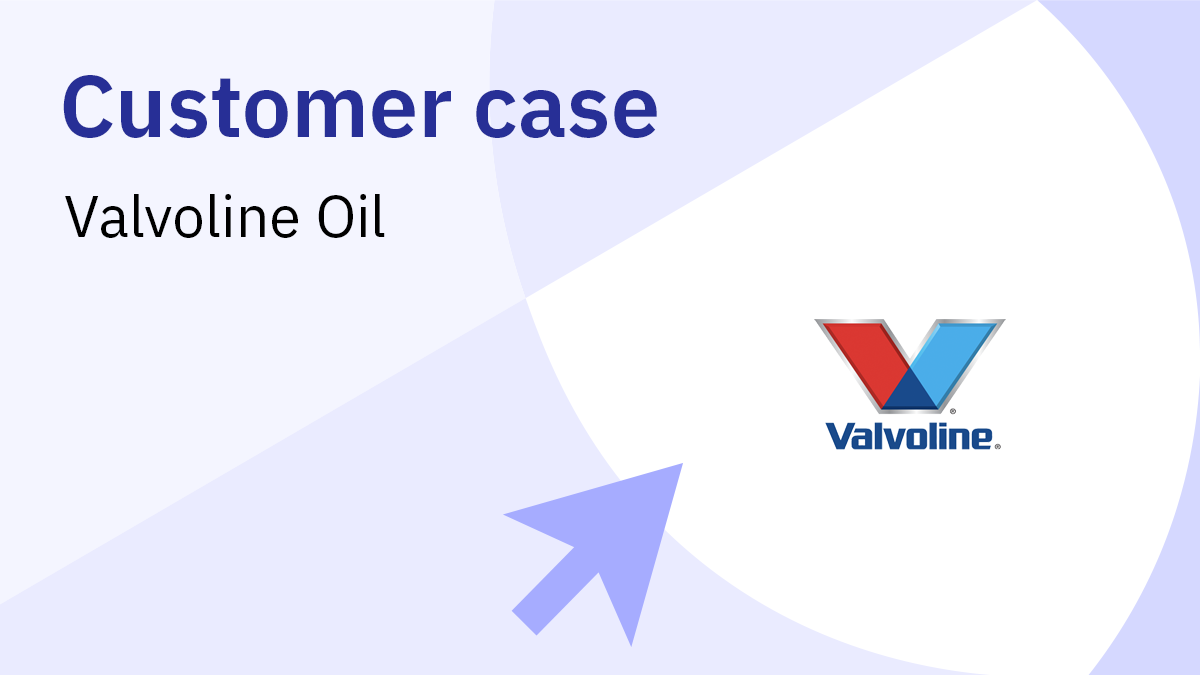
Before Valvoline Oil A/S switched to EcoOnline’s digital solution, they were wasting time and effort inefficiently trying to maintain their paper-based SDS management system.
This created silos, making it difficult to distribute the SDSs to the appropriate people across their organisation. This was not sustainable for their company or customers, so they started to look for a solution.
Within a couple of months of implementing our digital solution, the entire team was using the tool. With a robust digital system, there were no longer piles of paperwork everywhere needing to be managed. They were able to quickly support their customers with chemical substitutions and revisions.
How many hours are you sinking into managing your SDSs?

We’ll hazard a guess that it’s too many. So how can you change that? Well, a digital solution is a great place to start. It can help you track and store all your SDSs in one handy location.
Booking a chat with our experts takes just one minute, but it’ll save you countless hours in the long run.

